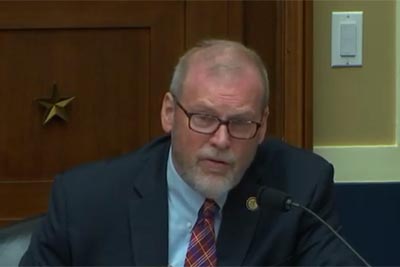Prescription Drugs: Lower Prices, More Cures
 Prescription drug prices burden the budgets of many. It is a problem that demands the attention of health care policymakers, but it must be solved correctly.
Prescription drug prices burden the budgets of many. It is a problem that demands the attention of health care policymakers, but it must be solved correctly.
Unfortunately, House Democrats are charging ahead with a bill that is unconstitutional and would create many more problems than it solves.
House Speaker Nancy Pelosi’s partisan drug pricing plan is H.R. 3. It was previously passed by the House of Representatives in 2019. At the time, I objected to its constitutionality, among other problems with the bill. The Democrat majority could have used its time since then to fix the bill, but it has chosen not to.
The central approach of H.R. 3 is the imposition of price controls on prescription drugs. The Democrats call it “negotiating.” In this negotiation, however, if the Federal Government and a drug manufacturer do not agree on a drug’s price, the government will tax the manufacturer up to 95 percent of the gross revenue.
Seriously?
If this is negotiation, it is negotiating with the threat of coercion looming over the manufacturers. The words of The Godfather come to mind: “I’m gonna make him an offer he can’t refuse.”
Worse, this provision is a violation of the Constitution’s Fifth Amendment, which prohibits private property from being “taken for public use, without just compensation.” It runs afoul of the Eighth Amendment prohibition on excessive fines, too.
I am not the only one noting H.R. 3’s constitutional problems. The nonpartisan Congressional Research Service has raised these points as well. But House Democrats did not bother to address these concerns.
Apart from constitutionality, H.R. 3 also threatens to undermine one of our country’s great strengths: the development of new drugs to treat and cure patients.
Great strides have been made in helping people live with or overcome conditions once thought incurable. Progress depended on private sector investment in research and development of new drugs. In 2018, the biopharmaceutical industry invested $102 billion for this purpose. By comparison, the entire budget of the National Institutes of Health that year was $35.4 billion, of which only eight percent went to drug research and development.
In my experience, I benefit from two drugs used in the United States since 2011 and 2012 to treat the blood clots I developed after COVID-19. Data suggest that one in six people who had the coronavirus have the same condition, which means the development of those drugs will have a vast impact. Prior to the development of these drugs, most people with blood clots had their ability to travel restricted, leaving them unable to perform jobs that require travel, such as salesmen, truckers, or even congressmen.
The process of developing a new drug can be costly and lengthy, but the results are counted in lives extended or saved.
Operation Warp Speed, the Trump Administration initiative that successfully produced multiple safe and effective COVID-19 vaccines, was a unique project, but the key to its success was its reliance on the private sector. The Federal Government counted on private industry’s ability to innovate. That dynamism delivered.
H.R. 3 shifts the initiative away from the private sector toward the government. Its dictation of prices would diminish the resources available for research into the next great cure or treatment. In fact, when H.R. 3 first passed the House in 2019, the Congressional Budget Office estimated that it would decrease the number of drugs introduced in the United States. That is a steep price to pay.
Reducing prescription drug prices can be done without sacrificing innovation. A bill I have cosponsored, the Lower Costs, More Cures Act, would introduce meaningful reforms and bring much-needed transparency to drug pricing.
Many of the ideas included in the bill have broad bipartisan support, such as curbs on the price of insulin. These benefits do not depend on an approach that sacrifices the development of new treatments and cures.
Speaker Pelosi has signaled her intention to move forward on H.R. 3 no matter what. Such a move would be a tremendous missed opportunity. There is a consensus that high prescription drug prices impose hardship on too many Americans. Consensus can be found on many of the responses to this problem, too, if House Democrats would set aside their determination to push a partisan bill. The issues at stake – the burdens placed on patients and the ability to develop new drugs to treat or cure them – should be too important to do otherwise.
If you have questions, concerns, or comments, feel free to contact my office. You can call my Abingdon office at 276-525-1405 or my Christiansburg office at 540-381-5671. To reach my office via email, please visit my website at www.morgangriffith.house.gov.









